| JANUARY 2023 |
|
7 shows in T˘ky˘ (Kabukiza, National Theatre, Asakusa K˘kaid˘, Shinbashi Enbuj˘), 1 in ďsaka (Sh˘chikuza), 1 in Ky˘to (Minamiza) and 1 tour (Zenshinza)!
|
| Kabukiza (T˘ky˘) |  |
| Dates | 2 ~ 27 January 2023 Kotobuki Hatsuharu ďkabuki Congratulation Early Spring Grand Kabuki |
| 1st Program |
Udoshi no Haru Kabuki Z˘shi Benten Musume Meo no Shiranami
|
| 2nd Program |
Kotobuki Eh˘ Soga |
| 3rd Program |
Sato Moy˘ Azami no Ironui (Izayoi Seishin) |
| Casting |
Living National Treasure Nakamura Baigyoku, Living National Treasure Nakamura T˘z˘, Matsumoto Haku˘, Nakamura Shikan, Matsumoto K˘shir˘, Ichikawa Ennosuke, Kataoka Ainosuke, Nakamura Kankur˘, Nakamura Shichinosuke, Nakamura Kaishun, Nakamura Jakuemon, Nakamura Ganjir˘, Nakamura Senjaku, Kataoka Takatar˘, Nakamura Kinnosuke, Nakamura Karoku, Nakamura Matagor˘, Band˘ Yajűr˘, Ichikawa Komaz˘ |
| Comments |
The three programs for the New Year Grand Kabuki at the Kabukiza. In 2023, the 5th Kabukiza celebrates the 10th anniversary of its opening.
|
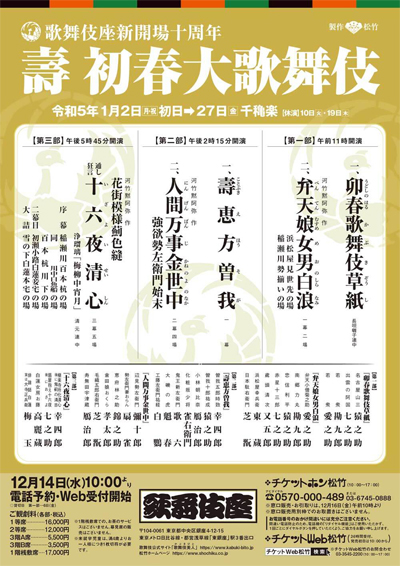 |
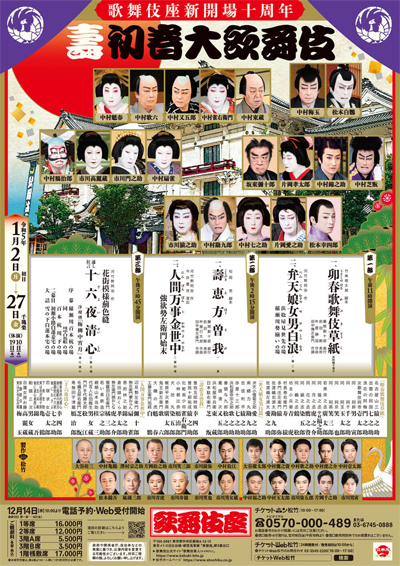 |
| National Theatre (T˘ky˘) |
| Dates | 3 ~ 27 January 2023 |
| Program | |
| Casting |
Living National Treasure Onoe Kikugor˘, Nakamura Tokiz˘, Onoe Kikunosuke, Onoe Sh˘roku |
| Comments |
The New year Kabuki performances at the National Theatre with the revival of Takeshiba Kisui's drama "T˘yama Zakura Tenp˘ Nikki".
|
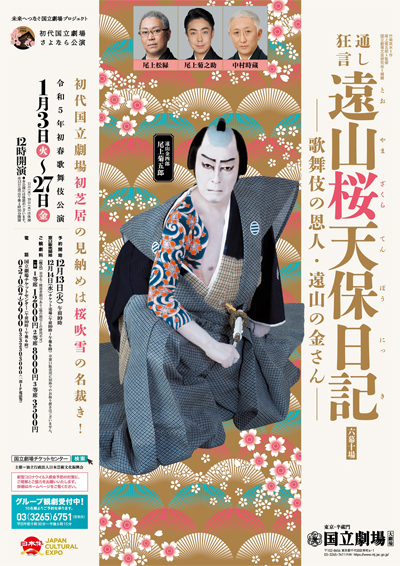 |
| Sh˘chikuza (ďsaka) |  |
| Dates | ??? ~ ??? January 2023 Band˘ Tamasabur˘ x Kod˘ Hatsuharu Tokubetsu K˘en Band˘ Tamasabur˘ Early Spring Special Performances |
| Program |
Yűgen |
| Casting |
Living National Treasure Band˘ Tamasabur˘ |
| Comments |
A special Buy˘ program at the Sh˘chikuza starring Living National Treasure Band˘ Tamasabur˘, who performs along with the Kod˘ taiko drummers in a 2017-premiered (in May 2017) dance-drama entitled "Yűgen", which features an array of classical Japanese images from plays by N˘ founder Zeami Motokiyo, incorporating themes from iconic works such as "Hagoromo" (The Feather Robe), "D˘j˘ji" (D˘j˘ji Temple) and "Shakky˘" (The Stone Bridge). |
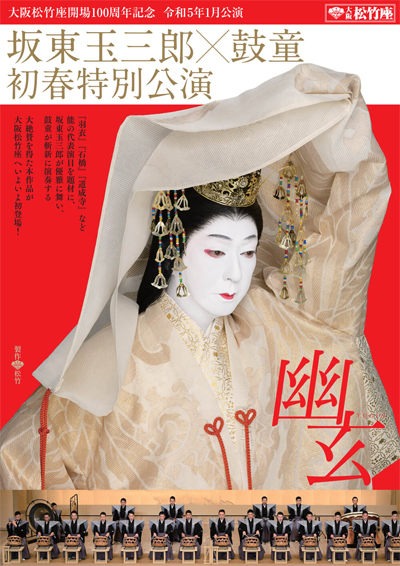 |
|
|||
| Dates | 2 ~ 24 January 2023 Shinshun Asakusa Kabuki New Year Asakusa Kabuki |
||
| MatinÚe | |||
| Evening |
Keisei Hangonk˘ (Domo Mata) |
||
| Casting |
Band˘ Minosuke, Nakamura Hayato, Onoe Matsuya, Band˘ Shingo, Nakamura Kash˘, Nakamura Hashinosuke, Nakamura Tanenosuke, Nakamura Kangyoku, Kamimura Kichiya, Nakamura Kamenoj˘, Nakamura Kichinoj˘ |
||
| Comments |
The yearly show for young promising actors at the Asakusa K˘kaid˘ in Asakusa, a lively and colorful neighboorhood that keeps the scent of old Edo.
|
||
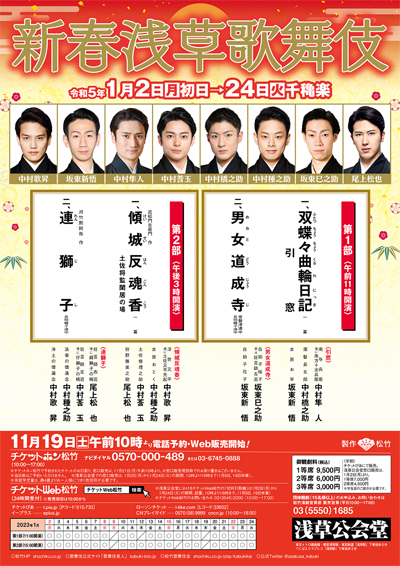 |
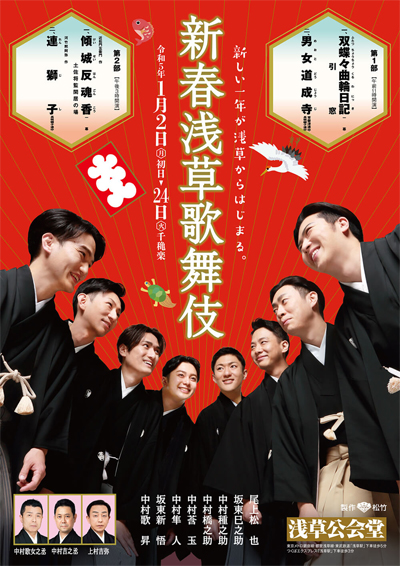 |
| Shinbashi Enbuj˘ (T˘ky˘) |  |
| Dates | 6 ~ 27 January 2023 Hatsuharu Kabuki K˘en ~ Ichikawa Danjűr˘ Shűmei Kinen Puroguramu Early Spring Kabuki Performances ~ Ichikawa Danjűr˘ Name-taking Commemoration Program |
| Program |
SANEMORI |
| Casting |
Ichikawa Danjűr˘, Nakamura Kotar˘, Ichikawa Udanji, Miyadate Ry˘ta |
| Comments |
The traditional New Year Kabuki at the Shinbashi Enbuj˘ with a troupe led by Ichikawa Danjűr˘. "SANEMORI" was premiered in November 2019 for the fifth edition of the ABKAI (Ebikai in Japanese) gala. This drama is based on the classic "Genpei Nunobiki no Taki" and the story of the warrior Sait˘ no Sanemori. The guest star is an aidoru named Miyadate Ry˘ta (belonging to a boy band named Snow Man). |
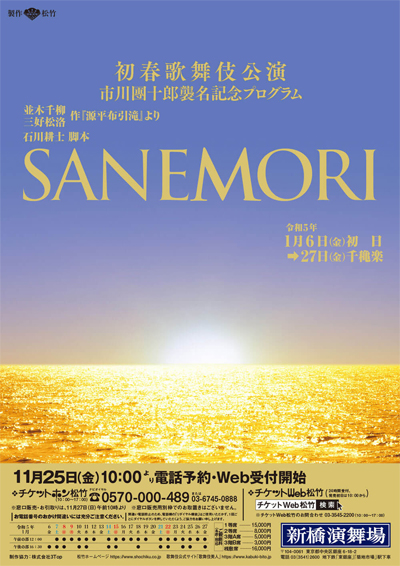 |
| Zenshinza Tour | |
| Dates | 26 January ~ 5 March 2023 |
| Program | |
| Casting |
Fujikawa Yanosuke, Yamazaki Tatsusabur˘, Nakajima K˘tar˘, Tamaura Yűnosuke, Hayase Einoj˘, Matsunami Kihachir˘, Arashi Ichitar˘, Watarai Motoyuki, Takei Shigeru, Ishijima Ryűsei |
| Comments |
A long tour for the Zenshinza troupe:
|
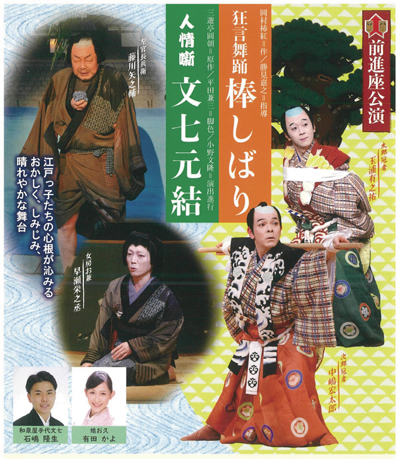 |
|
|
| Contact | Main | Top | Updates | Actors | Plays | Playwrights | Programs | Links | FAQ | Glossary | Chronology | Illustrations | Prints | Characters | Derivatives | Theaters | Coming soon | News |